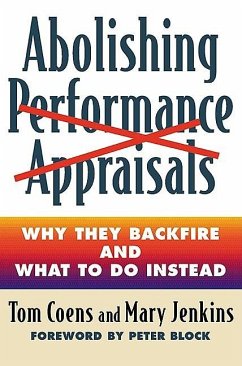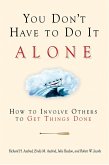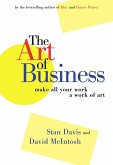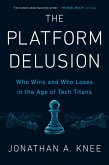Performance appraisals are used in the overwhelming majority of workplaces. Yet, most organizations that use appraisal-and a similar percentage of givers and receivers of appraisal-are dissatisfied with the process. Many are beginning to deeply question whether appraisal is necessary and consistent with the work culture espoused by progressive organizations. Abolishing Performance Appraisals provides an insightful, well documented look at the flaws of appraisal-including its destructive, unintended effects-and offers practical guidance to organizations that want to move on to more progressive approaches to coaching, feedback, development, and compensation. While many books prescribe cures for appraisal, this is the first to focus exclusively on eliminating appraisal altogether and creating alternative, non-appraisal approaches based upon progressive and healthier assumptions about people. The authors expose and dispel the widely accepted myths and false assumptions that underlie common management strategies surrounding the five key functions of appraisal-coaching, feedback, development, compensation, and legal documentation. They then offer step-by-step practical guidance on implementing alternative non-appraisal strategies that deliver the objectives of each function. And they suggest ways to give supervisors and managers the freedom to choose for themselves the most effective ways of working with people. Filled with real-life examples, resources, tools, and detailed practical advice, Abolishing Performance Appraisals is an entirely fresh and radically different view of performance appraisal and its functions that will help people start over and discover new and more effective approaches.
Dieser Download kann aus rechtlichen Gründen nur mit Rechnungsadresse in A, D ausgeliefert werden.
Coens and Jenkins have taken a well-known secret and blasted it out of the closet into the light of day . . . .Traditional supervisors and managers should beware: this is a book of the people, speaking the words they have wanted to say for a long time.
Sue Brightman-Glover, O. D. Consultant, Houston,Texas
[This book] speaks no nonsense. . . . I really once thought [appraisal] . . . was unchallengeable. . . .Thanks [to] Coens and Jenkins for proving me wrong. As a consultant, I [am] committed to act on what Coens and Jenkins advocate.
Joey Chan, Consultant, Hong Kong
I enjoyed [this book] very much . . . . [The authors] do an excellent job of arguing that traditional performance appraisals reinforce paternalism and are out of step with today s emerging workplace that emphasizes partnership.
David Cox, AQP News for a Change
Coens and Jenkins have done fabulous work in finally helping us overcome the worst blot on HR s record.They show how to eliminate appraisal while better handling the legal, compensation, and organizational effectiveness issues that led us to appraisals in the first place.
David Creelman, HR.com, Ontario, Canada
This book is a must-read for business owners, managers, and HR executives who are focused on creating an environment were people can contribute, perform, communicate, innovate, take pride in their work . . . .This is one of the top five books every executive should read and apply as soon as possible.
Marcia Daszko, Consultant, Santa Clara, California
This book is extraordinarily practical on the how tos of abolishing a process that has not worked . . . beyond that the authors have expressed a deep understanding of the human spirit. They have captured the essence of how feedback encourages and judgment deadens that spirit.
Norma Hagenow, President and CEO, Genesys Health System
This book is aimed at practitioners and leaders but should be assigned in business schools. It is a provocative and positive counterpoint to scholarly books that reinforce the old thinking that has plagued managers, employees, and their organizations for the last century.
Michael L. Moore, Ph.D. Michigan State University and coauthor of Knowledge-Driven Work
The concepts outlined in Abolishing Performance Appraisals revolutionized our approach to faculty evaluation and college-wide achievement. At last, the entire college is moving toward alignment of goals on all levels and recognizing individual contributions.Three cheers for Tom Coens and Mary Jenkins for moving us out of the dark ages of performance evaluations!
Gayle Nolan, Director of Faculty and Staff Development, Delgado Community College, New Orleans, Louisiana
No book in recent years has been more thought provoking on the practical side of performance management. It has become something of a Human Capital Desk Reference for me my copy lives in my right hand desk drawer and has more dog-eared pages, yellow stickies, and highlighted passages than my day timer.
David Paulsen, Director of People Matters, Accenture Government Operating Group,Washington, D.C.
Coens and Jenkins have created a beautiful book about an ugly subject performance appraisal. The beauty lies in the simplicity and profound rightness of their conclusion abolish it and in their thoughtful, practical advice about what to do instead.This is a book for all who possess the wisdom and courage to truly welcome the power of human spirit in organizations.
Dick Richards, Author of Artful Work
Coens and Jenkins do a masterful job in exposing the fatal flaws and faulty assumptions of performance appraisal.They offer dozens of real-world examples to prove there are alternatives that get better results.
Jay Robb, The Hamilton Spectator, Hamilton, Ontario, Canada
The authors rate an excellent for demonstrating the ability to think creatively and for generally exceeding expectations for books in this category.
David Rouse, Booklist
A well documented and organized explanation of why the common-sense notion of giving performance appraisals is wrong. The book gives many ideas on what to do instead . . . . I hope that my competition does not find out about this book.
Dick Steele, CEO, Peaker Services, Inc., Milford, Michigan
I recommend this book to both practitioners and academics . . . . I am going to use it as the text on performance appraisal for an MBA course on staffing and appraisal. . . . [This book] has something important to say about what healthy organizations should look like.
Jon M.Werner, Ph.D., Associate Professor of Management, University of Wisconsin Whitewater, Personnel Psychology
Sue Brightman-Glover, O. D. Consultant, Houston,Texas
[This book] speaks no nonsense. . . . I really once thought [appraisal] . . . was unchallengeable. . . .Thanks [to] Coens and Jenkins for proving me wrong. As a consultant, I [am] committed to act on what Coens and Jenkins advocate.
Joey Chan, Consultant, Hong Kong
I enjoyed [this book] very much . . . . [The authors] do an excellent job of arguing that traditional performance appraisals reinforce paternalism and are out of step with today s emerging workplace that emphasizes partnership.
David Cox, AQP News for a Change
Coens and Jenkins have done fabulous work in finally helping us overcome the worst blot on HR s record.They show how to eliminate appraisal while better handling the legal, compensation, and organizational effectiveness issues that led us to appraisals in the first place.
David Creelman, HR.com, Ontario, Canada
This book is a must-read for business owners, managers, and HR executives who are focused on creating an environment were people can contribute, perform, communicate, innovate, take pride in their work . . . .This is one of the top five books every executive should read and apply as soon as possible.
Marcia Daszko, Consultant, Santa Clara, California
This book is extraordinarily practical on the how tos of abolishing a process that has not worked . . . beyond that the authors have expressed a deep understanding of the human spirit. They have captured the essence of how feedback encourages and judgment deadens that spirit.
Norma Hagenow, President and CEO, Genesys Health System
This book is aimed at practitioners and leaders but should be assigned in business schools. It is a provocative and positive counterpoint to scholarly books that reinforce the old thinking that has plagued managers, employees, and their organizations for the last century.
Michael L. Moore, Ph.D. Michigan State University and coauthor of Knowledge-Driven Work
The concepts outlined in Abolishing Performance Appraisals revolutionized our approach to faculty evaluation and college-wide achievement. At last, the entire college is moving toward alignment of goals on all levels and recognizing individual contributions.Three cheers for Tom Coens and Mary Jenkins for moving us out of the dark ages of performance evaluations!
Gayle Nolan, Director of Faculty and Staff Development, Delgado Community College, New Orleans, Louisiana
No book in recent years has been more thought provoking on the practical side of performance management. It has become something of a Human Capital Desk Reference for me my copy lives in my right hand desk drawer and has more dog-eared pages, yellow stickies, and highlighted passages than my day timer.
David Paulsen, Director of People Matters, Accenture Government Operating Group,Washington, D.C.
Coens and Jenkins have created a beautiful book about an ugly subject performance appraisal. The beauty lies in the simplicity and profound rightness of their conclusion abolish it and in their thoughtful, practical advice about what to do instead.This is a book for all who possess the wisdom and courage to truly welcome the power of human spirit in organizations.
Dick Richards, Author of Artful Work
Coens and Jenkins do a masterful job in exposing the fatal flaws and faulty assumptions of performance appraisal.They offer dozens of real-world examples to prove there are alternatives that get better results.
Jay Robb, The Hamilton Spectator, Hamilton, Ontario, Canada
The authors rate an excellent for demonstrating the ability to think creatively and for generally exceeding expectations for books in this category.
David Rouse, Booklist
A well documented and organized explanation of why the common-sense notion of giving performance appraisals is wrong. The book gives many ideas on what to do instead . . . . I hope that my competition does not find out about this book.
Dick Steele, CEO, Peaker Services, Inc., Milford, Michigan
I recommend this book to both practitioners and academics . . . . I am going to use it as the text on performance appraisal for an MBA course on staffing and appraisal. . . . [This book] has something important to say about what healthy organizations should look like.
Jon M.Werner, Ph.D., Associate Professor of Management, University of Wisconsin Whitewater, Personnel Psychology









